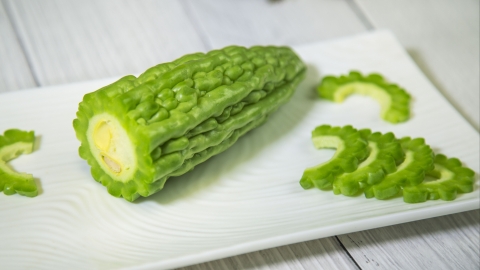Which Three Types of Food Are Most Feared for Cold Body Constitution?
Generally speaking, there is no specific saying about "three foods that cold-body constitution people fear the most." People with cold-body constitution have a cooler physical condition and should avoid consuming bitter gourd, crab, seaweed, mung beans, cold beverages, and similar foods, as these may exacerbate discomfort and should be consumed cautiously. Detailed explanations are as follows:

1. Bitter gourd: Bitter gourd is cold in nature and bitter in taste. Although it has heat-clearing properties, its consumption by individuals with cold-body constitution may intensify internal coldness, irritate the gastrointestinal tract, cause abdominal pain and diarrhea, and worsen symptoms such as cold hands and feet and sensitivity to cold, which is unfavorable for improving body constitution.
2. Crab: Crab is cold in nature and salty in taste, making it a typical cold-natured food. Consumption by individuals with cold-body constitution may damage the spleen and stomach's yang energy, leading to spleen-stomach deficiency coldness, causing symptoms such as abdominal bloating and loose stools. Female individuals may experience exacerbated menstrual pain, which increases the physical burden.
3. Seaweed: Seaweed is cool in nature and salty in taste, with certain diuretic effects. During cold-body conditions, its cool nature may penetrate the body, affect blood and qi circulation, potentially causing fatigue and low spirits. Excessive consumption may also lead to gastrointestinal discomfort and worsen symptoms of cold-body constitution.
4. Mung beans: Mung beans are cool in nature and sweet in taste, commonly used for clearing heat and relieving summerheat. Consumption by individuals with cold-body constitution may deplete the body's yang energy, intensify cold symptoms, and cause diarrhea and sensitivity to cold, especially when consumed during autumn and winter seasons or on an empty stomach, which has a more pronounced negative effect on the body.
5. Cold beverages: Cold beverages are extremely low in temperature and often high in sugar. Consumption by individuals with cold-body constitution may directly irritate the gastrointestinal tract, impair the spleen and stomach's transformation and transportation functions, potentially causing abdominal pain and diarrhea, while further intensifying internal coldness, making symptoms such as cold hands and feet and cold sensitivity more pronounced.
Individuals with cold-body constitution should prioritize warm-natured foods in their daily diet, such as ginger, lamb, and longan. During cooking, warming seasonings like scallions, ginger, and garlic can be appropriately added to neutralize the cooling properties of ingredients. Additionally, raw and cold foods should be avoided, and appropriate exercise and warm compresses can be used to help improve cold-body constitution and reduce uncomfortable symptoms.




